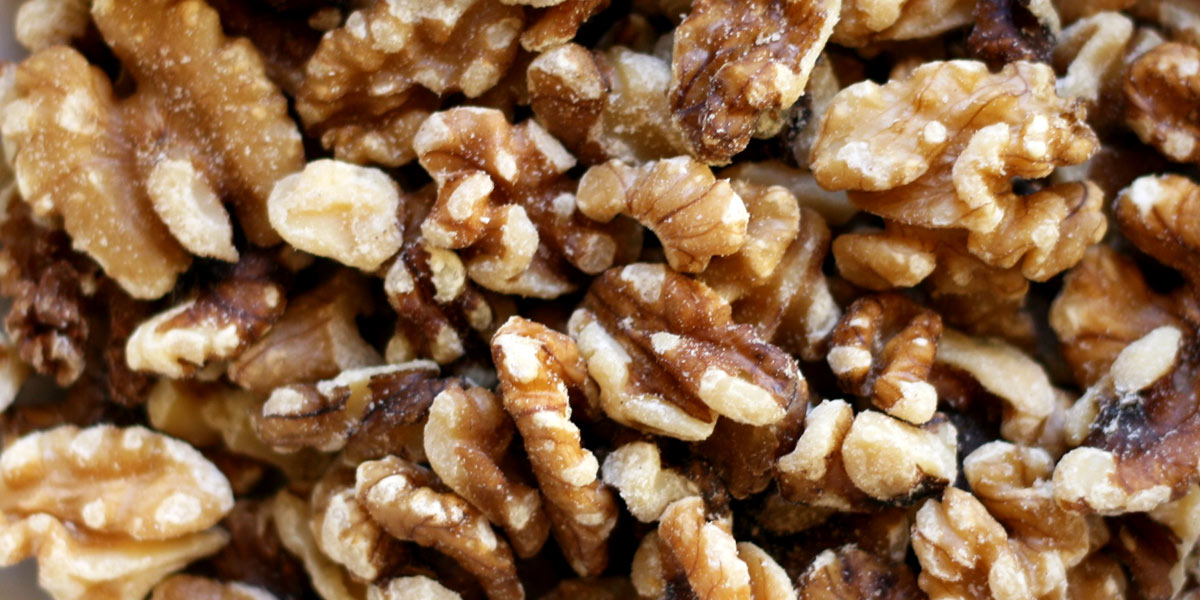Walnuts
My favorite nut of them all, walnuts come in several varieties and have a earthy, fruity, and tart taste to them. Roasted or raw, they make a great addition to salads, pancakes, oats, granola, muffins, cookies, coconut yogurt, and desserts.
- Walnuts are bursting with anti-inflammatory antioxidants, and include some key phytonutrients found in virtually no other foods! (quinone juglone to be specific!)
- Make sure to eat the skin, as 90% of the amazing antioxidants in walnuts are found there.
- Walnuts are a rich source of heart-healthy monounsaturated fats and are an excellent source of Omega-3 fatty acids – both of which help to prevent a wide variety of cardiovascular problems including heart disease and high blood pressure.
- Have you ever noticed that walnuts look like tiny human brains? Turns out, they may be good for your brains too! All the Vitamin E, Omega-3 fatty acids, folate, and melatonin in walnuts support brain health and may also enhance motor functioning in aging adults.
- Five large human studies, which looked at how disease spreads and can be controlled, estimated that substituting nuts for the same amount of carbohydrates in an average diet resulted in a 30% reduction in heart disease risk. A reduction of 45% occurred when fat from nuts was substituted for saturated fats, which are found primarily in meat and dairy products.
- Walnuts contain arginine, an essential amino acid that is converted into nitric oxide in the bod. Nitric oxide enables blood vessels to relax, therefore improving blood flow and preventing platelet aggregation.
Vegukate Tips:
Store shelled or unshelled walnuts in an airtight container in the refrigerator for six months, or in the freezer for up to a year. Walnuts are also highly perishable. Do the sniff test if your walnuts seem suspect: if they have a paint-like odor, they’ve gone rancid and need to be tossed.
-
Grain-Free Chocolate Orange Tahini Granola

Rich cacao + sweet citrus + creamy tahini + crunchy nuts = a nutty and addictive granola recipe to brighten up winter mornings. Read the recipe
-
Whipped Chia Seed and Flax Seed Raspberry Pudding

Sweet raspberries + healthy fat filled seeds, avocado, and coconut milk make this breakfast the perfect nourishing treat! Read the recipe
-
Gluten-Free Blackberry Crumble Pie

Alllll the nutrient-dense blackberries, a simple crust, and a delectable gluten-free pie recipe. Happy baking! Read the recipe
-
Date and Walnut Stuffed Apples

Crisp and sweet Autumn Glory apples + warming spices + caramel dates + crunchy walnuts = the sweetest snack ever. Read the recipe (3 comments)
-
Apple Spice Donut Holes

Sweet roasted apples + warming spices + crunchy walnuts and almonds + heart healthy oats + gooey dates + fiber filled coconut flour = apple spice donut holes. Yum! Read the recipe (5 comments)
-
Banana Walnut Crumble Muffins

Sweet and ripe bananas + crunchy walnuts + fiber friendly oat flour + warming cinnamon + healthy fat filled coconut oil = muffins that are absolutely bananas. Read the recipe (2 comments)
-
Chunky Coco Monkey Ice Cream

Sweet and ripe bananas + creamy coconut + sticky sweet dates + luscious vanilla + crunchy walnuts + rich cacao nibs = the chunkiest, monkiest, most delicious raw vegan ice cream to ever be! (and no ice cream maker needed!) Read the recipe (4 comments)
-
Raw Buckwheat, Walnut, & Date Porridge

A creamy, raw porridge made with soaked buckwheat and walnuts, plus sweet dates. The perfect start to your morning! Read the recipe (4 comments)
-
Chopped Kale and Apple Salad with Maple Tahini Dressing

Another season, another kale salad. Celebrate autumn with crisp, juicy apples, sweet pomegrante seeds, red walnuts, seasonal kale, and the most delicious maple tahini dressing! Read the recipe (5 comments)
-
Kale, Farro, and Sweet Potato Salad

Let’s dig into a hearty bowl filled with massaged kale, crunchy walnuts, nutty farro, and creamy sweet potato. All that goodness in a salad? Oh yeah, it is definitely tuck-in worthy. Read the recipe
-
Raw (3 Ingredient) Brownies

3 Ingredient Raw Brownies that anyone can make. So sinfully delicious, yet super healthy and nourishing. Read the recipe (3 comments)
-
Walnut Basil Pesto with Zucchini Noodles

Homemade pesto, the Italian coastline, Italian nonnas, and all things zoodles. VeguKate is going Italiano! Read the recipe (1 comment)
-
Chocolate Coconut Energy Bars

Never buy store-bought energy bars again. These bars are made with wholesome ingredients that will make you sparkle and shine and don’t include unnecessary additives, preservatives, and nasties to make you dull and icky. Read the recipe (1 comment)
-
Cinnamon Raisin Nut Butter

My earth-shattering revolution that changed all PB&J's for life. Thanks dad! Read the recipe

